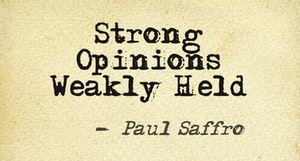Jeremie Averous's Blog, page 51
November 20, 2018
How We Should Have Strong Opinions, Weakly Held
In an excellent piece about how develop a community and allow constructive debate, Pamela Slim states “It is important to be flexible in thinking and open to change, or as my friend Bob Sutton likes to phrase it “Strong opinions, weakly held.””
 I love this statement. We definitely need to hold strong opinions on things; this is a proof of character and that we don’t take things for granted. At the same time, we need to be ready to put our beliefs in question and be open to contradictory evidence. The statement is then a beautiful call for open-mindedness and tolerance of other’s opinions.
I love this statement. We definitely need to hold strong opinions on things; this is a proof of character and that we don’t take things for granted. At the same time, we need to be ready to put our beliefs in question and be open to contradictory evidence. The statement is then a beautiful call for open-mindedness and tolerance of other’s opinions.
As Pamela writes: “I do not like conflict. And I have learned to embrace it, since it is impossible to do anything meaningful without making mistakes, running into differing opinions or pissing someone off. It is important that we speak clearly, openly and honestly to each other when we don’t agree on something. It is important that we listen with an open heart, and curiosity.”

November 17, 2018
How Starting Something Often Takes Longer Than Doing It
In his post ‘But why does it take so long?‘, Seth Godin states that “Persuading ourselves to move forward can take even longer [than doing, coordinating, persuading, pathfinding…]”
 I find this observation very much to the point: although building something takes time, for the vast majority of people, just deciding to start takes even more time (and sometimes an infinite duration as they never get to start).
I find this observation very much to the point: although building something takes time, for the vast majority of people, just deciding to start takes even more time (and sometimes an infinite duration as they never get to start).
It is only by trying many things that one finds what works for himself and for the world. Therefore, losing excessive time deciding to start is probably the number one issue why people don’t manage to achieve what they aspire to.
Don’t spend too much time overthinking about what you want to start. Just start it. Start it small, start it slow but start. That’s the key.

November 15, 2018
How Country Fragmentation and Diversity May Relate to Country Economic Performance
There is debate between the possible influence of a country diversity ratio on its economic performance. In this interesting Canadian article the author ( a university professor) argues that Canada’s high diversity causes an economic weakness: ‘Actually, evidence shows ‘diversity’ makes countries weaker — not stronger‘. On the other hand, we also know a lot of circumstantial evidence that diversity brings major benefits to a community.
 The first step is to observe countries’ diversity indicators. The result can be surprising, for example I discovered that France is rather low on the ethnic fragmentation / diversity index (although that might be different in Paris region – one of the economic centers). Canada appears to be very high, quite higher than the US (but then again it would be interesting to know how the San Francisco area fares in that respect, with also high economic growth and high diversity created by the influx of workers).
The first step is to observe countries’ diversity indicators. The result can be surprising, for example I discovered that France is rather low on the ethnic fragmentation / diversity index (although that might be different in Paris region – one of the economic centers). Canada appears to be very high, quite higher than the US (but then again it would be interesting to know how the San Francisco area fares in that respect, with also high economic growth and high diversity created by the influx of workers).
The author then quotes studies that have shown that social fragmentation creates lower economic performance. One can observe that ethnic diversity is not necessarily related to social fragmentation, which can be created by other reasons such as income inequality. Therefore, fragmentation can certainly impact economic growth, but the relation with ethnic fragmentation can be questioned.
Anyway those issues are quite interesting to observe inasmuch as ethnic diversity is rather prone to increase in the Collaborative Age as globalization will increase.

November 13, 2018
How Goodhart’s Law Makes Us Aware of the Downside of Measurement
Goodhart’s law basically says that ‘When a measure becomes a metric, it ceases to be a good measure’. This is quite powerful, and observable on a daily basis in all sorts of settings.
 This law has profound implications about target-setting in organizations and many other situations. In the very recommended post ‘Goodhart’s Law and Why Measurement is Hard‘, the author explores measurement in complex situations. And in effect, complexity ruins the interest of measurement, because of the retro-actions of measurement on the system. Goodhart’s law is thus fundamentally an observation from complex systems that evolve as a result of self-measures.
This law has profound implications about target-setting in organizations and many other situations. In the very recommended post ‘Goodhart’s Law and Why Measurement is Hard‘, the author explores measurement in complex situations. And in effect, complexity ruins the interest of measurement, because of the retro-actions of measurement on the system. Goodhart’s law is thus fundamentally an observation from complex systems that evolve as a result of self-measures.
Goodhart’s law is mostly important in organizational settings: it is important to measure, but as soon as a measure is in place, it becomes a target and therefore, drives behavior – sometimes in a unfavorable manner. The only response is either, to measure but not publicize the metric; or use some version of a balanced scorecards with several balances metrics.
In any case, beware the Goodhart’s law when defining metrics in your organization!

November 10, 2018
How to Organize an Executive “Retreat” (or rather an “Advance”?)
I love Seth Godin’s post on how to organize a company retreat ‘How to organize a retreat‘.
 It starts by remarking that the word itself is a bit strange – it looks a bit like executives are trying to hide. Seth Godin proposes rather to use the term ‘Advance’. We could also use the term ‘Re-centering’.
It starts by remarking that the word itself is a bit strange – it looks a bit like executives are trying to hide. Seth Godin proposes rather to use the term ‘Advance’. We could also use the term ‘Re-centering’.
An executive retreat is about taking some time building the team and thinking about the future of the organization, or some bold initiative. It is thus mainly about connecting at the emotional level, and I invite you to read Seth Godin’s recommendations again about how to achieve this and not some kind of boring event.
I would like to add a recommendation: keep it small, keep it tribe-like. Don’t envisage huge events, but make sure connection happens at the right level.
Careful when you think about your next executive “retreat”. Take some time to think about how what you want to achieve, and “Advance”!

November 8, 2018
How the Priority of a Company Should be to Survive
I noted this interesting quote: “a business professor at INSEAD, the renowned global business school, hammering to his students: “You know what should be the priority of a company? It’s not growth, or anything else. It is to survive!”” from a post on Facebook business model by Frederic Filloux. In my experience as an entrepreneur and wathcing also our industrial clients be born, live and die, I find this assertion quite true.
 In particular, over-extension in growth is often a very fatal situation: the burden of debt can’t be repaid when the industry comes down or when execution does not follow. Focus on survival, prudent management should definitely be essential priorities.
In particular, over-extension in growth is often a very fatal situation: the burden of debt can’t be repaid when the industry comes down or when execution does not follow. Focus on survival, prudent management should definitely be essential priorities.
I am always amazed on how tough it is to be profitable and build substantial reserves to cover downturns, and how quick things can go down when there is a downturn. There is an essential non-symmetry that is very difficult to overcome even when ones reacts quickly and massively to a downturn, cutting costs.
Finally it is all about natural selection: extinction is the rule, and survival is the exception. Substantial growth is the uber-exception, so when it happens, care should be exercised!

November 6, 2018
How Good People Don’t Wait for Opportunities, they Create Them
I like this post from Om Swami ‘Four Traits of Successful People‘. The post is mainly about the fact that you should not wait for opportunities, but create them.
 “I meet brilliant people all the time who could do a lot more in their life. But, they are stuck, they feel. Life hasn’t been fair to them or they are waiting for the right opportunity, they tell me.”
“I meet brilliant people all the time who could do a lot more in their life. But, they are stuck, they feel. Life hasn’t been fair to them or they are waiting for the right opportunity, they tell me.”
Of course it may sometimes be easier to say than to do. But, “If you say, I can’t do it, you are right already. If you ask, how can I do it, at least your mind will shift from denial to a thinking mode.”
We need to shift more often to ‘how can I do it’ mode and create opportunities. Some will work, some won’t, you might get lucky or unlucky, but at the end you’ll have created your way.
When do you start?

November 3, 2018
How the Collaborative Age Seems to Create Increasing Rural Abandonment
Rural abandonment is an increasing reality. It is also a key driver of politics in many countries, with votes being increasingly differentiated between city and countryside; and votes in the countryside being increasingly extremist. One of the latest examples is the cancellation of rural bus lines over the entirety of west Canada: ‘Decline of Greyhound service mirrors rural Canada’s plight‘.
 Abandoned basic services in rural France
Abandoned basic services in rural FranceA few years ago, with the the rise of internet, visionaries were considering rather the contrary, with city people moving back to rural places, creating life again there, and working remotely from home. There are still regularly a few stories about such experiences, but more often, people are just moving from larger to smaller cities for an improved lifestyle.
As of now, rural abandonment seems in general to increase, and additional forces tend to reinforce the trend:
agricultural work seems increasingly ripe to robotisation, as work is performed in a relatively simple environment, and GPS based optimisation can increase yield significantly,
weaker government resources reduce subsidization of rural public services
the mix of ideas is much better in cities, creating additional value and an increasing value gap
in a negative cycle, the loss of basic businesses and services in rural areas makes life harder and increases the migration to local towns
The rural territory is an asset and should not be seen as a burden or just as a playground for city folks. Some isolated initiatives give new economic life to certain territories but they are still far apart.
This issue of rural abandonment needs to be addressed proactively by governments: otherwise the burden of maintenance will increase dramatically. I am looking forward to hear about possible initiatives.

How Non-Compete Constraints on Employees Are Non-Productive
There is always a heated debate on the interest for an organization to introduce non-compete clauses in its employment contracts. I truly believe that those clauses are counter-productive.
 As an aside to an interesting post explaining why Facebook’s business model is flawed and won’t change ‘“Do no harm” to Facebook’s business model’, Frederic Filloux quotes “A Stanford professor told me once that the absence of a non-compete clause in California’s labor laws has been a key factor to the rise of Silicon Valley against the startup ecosystem of the East Coast.” And indeed, it appears that California does not allow those clauses, whereas in the rest of the US and of the world they tend to be widespread (in France their impact is limited by the fact that the employer must compensate for the application of the clause, which makes it onerous).
As an aside to an interesting post explaining why Facebook’s business model is flawed and won’t change ‘“Do no harm” to Facebook’s business model’, Frederic Filloux quotes “A Stanford professor told me once that the absence of a non-compete clause in California’s labor laws has been a key factor to the rise of Silicon Valley against the startup ecosystem of the East Coast.” And indeed, it appears that California does not allow those clauses, whereas in the rest of the US and of the world they tend to be widespread (in France their impact is limited by the fact that the employer must compensate for the application of the clause, which makes it onerous).
I believe those clauses are stupid, in part because they stop innovation, they are difficult to apply in reality, and they create all sort of resentment between the employee and the employer. They should be limited to issues of commercial nature. In the collaborative Age, any impediment to the creation of teams to innovate and solve complex projects should be removed for the system to be effective.

November 1, 2018
How the Concept of Postal Address is Being Overturned
We are all familiar with the concept of postal address and postal code, at least in developed country. A new way of describing the physical location is on the way: read ‘This Startup Slices the World Into 57 Trillion Squares‘.
 The logic behind postal addresses differs substantially between countries, and this was an important factor of complication (Japan having a very different logic from Europe, the UK having a postal code per main building, etc) and less developed countries ares struggling to cope with the speed of urbanisation to implement a postal address system.
The logic behind postal addresses differs substantially between countries, and this was an important factor of complication (Japan having a very different logic from Europe, the UK having a postal code per main building, etc) and less developed countries ares struggling to cope with the speed of urbanisation to implement a postal address system.
And the best with the proposed new system is that each point (actuall each 3m square) is designated by 3 words and not a difficult list of numbers. It is quite interesting to visit their website What3words. You can figure out easily how your location is designated.
Of course the 3 words combinations are not always great, but at least they are quite memorable and practical. A great way to replace postal addresses worldwide!




